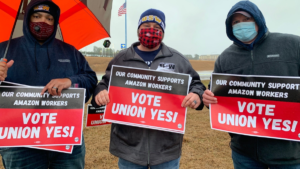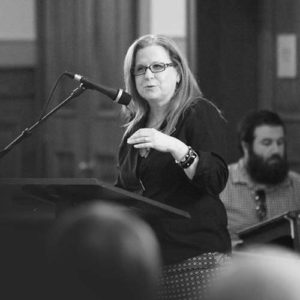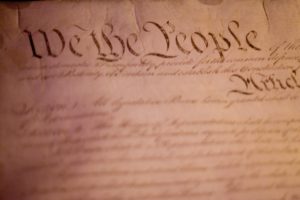Podcast: Play in new window | Download
Amazon Workers Unionize At Fulfillment Center In Bessemer, Alabama
There’s an historic battle for union recognition going on now at the Amazon fulfillment center in Bessemer, Alabama where mostly black workers package and ship orders to customers across the South. The votes of 5800 Amazon workers are being counted. On March 29th we will know the outcome on whether the first ever labor union representing Amazon employees with the Retail, Wholesale and Department Store Union will prevail against a vicious trillion dollar company whose profits have almost doubled since the onset of the pandemic. Amazon owner Jeff Bezos is worth $184 billion and is one of the richest men in America.
Amazon employs 1 million people, second only to Walmart which employees over 2 million people. Because most of the workers at the Alabama Fulfillment Center are African-American, the unionization battle is also a civil rights fight. They’ve gotten broad solidarity from many such as celebrity Danny Glover, politicians Jamaal Bowman and Bernie Sanders, and even the players unions in major league baseball and the NFL.
Will a victory in Bessemer open the floodgates? Will other large company work forces be unionized? Will the South be unionized? Will this spread to the north? Historically the south has been a dragging progress in America going all the way back to the time of slavery. Will this start to change?
Guest – Michael Goldfield, former civil rights and labor activist and agitator, Professor Emeritus, and currently a research fellow at Wayne State University in Detroit. He is the author of numerous books and articles on race, labor, and the global economy, including The Decline of Organized Labor in the United States, The Color of Politics: Race and the Main- springs of American Politics, and most recently, The Southern Key: Class, Race, and Radicalism in the 1930s and 1940s.
—-
Florida Based Organization Tries To Unite Political Divisions
When asked about the state of politician’s discourse in the US, the public renders a harsh judgment. Many Americans say that their own personal conversations about political issues have become stressful incidents that they’d rather avoid, according to a Pew research poll.
A majority say the tone and nature of debate between politicians has become less fact-based, less respectful, less substantive, and more negative in the past few years. And everyday conversations about politics and other sensitive issues like abortion and free speech are often tense. Half say talking about politics with people they disagree with politically is “stressful and frustrating.”
When speaking with people they don’t know well, more Americans say they would be very comfortable talking about the weather and sports – and even religion – than politics. And it is people who are most comfortable with interpersonal conflict, including arguing with other people, who also are most likely to talk about politics frequently and to be politically engaged.
Why does this matter?
The founding fathers knew that with any political issue came disagreement so they created a system that runs on disagreement. The checks and balances between the branches of power within the Republic depend on division to protect freedom and liberty. The power of one branch is checked when another branch disagrees and seeks to enact its own ideas. So political disagreement, even bitter disagreement, isn’t new. What’s new is the idea that someone who disagrees with you is your enemy. One organization is trying to change this. The Florida-based Village Square has the mission of reviving civic connections across divisions in American communities.
Guest – Liz Joyner, Village Square founder and CEO. Liz has a Masters Degree in Social Work and created the Village Square after her experience working in politics convinced her that the way we work out disagreements in today’s public square is fundamentally flawed.
—————————————————




